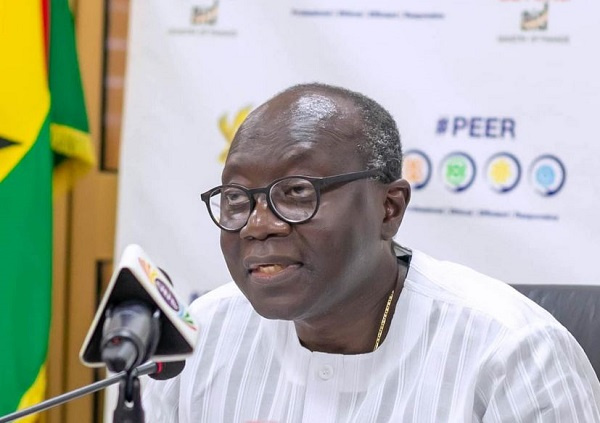
Audio By Carbonatix
The Finance Minister, Ken Ofori-Atta, is optimistic that the board of the International Monetary Fund (IMF) would approve the second tranche of the country’s deal with the Fund.
Speaking on the business edition of JoyNews’ PM Express, the Minister said he has engaged external creditors who have, in turn, given him positive assurances about the fate of Ghana’s debt restructuring programme in the coming weeks.
It is on the back of these, that Mr Ofori-Atta remains hopeful that the country would successfully get the Fund’s Board to approve the second tranche of its financial support. The IMF Board is expected to meet in November 2023, to consider the second tranche of $600 million for Ghana as part of the Fund-support programme.
“My deep sense is that we will get whatever is appropriate for the Fund Board to be able to make their decision in November. I am confident about it. And yes, we did meet with the officials from Paris Club and there was pretty positive assurance.
“I also had the opportunity to meet the Governor of the PPOC of China which is their central bank and his assurances were also very positive. So really, I am confident that we would get to the Board and it will approve our next tranche,” he told George Wiafe on Thursday.
Ghana is eagerly anticipating the arrival of its second tranche of financial support from the IMF. However, the country faces a hurdle as it is mandated to restructure its external debt as a prerequisite for the aid package. Failure to comply with this requirement could potentially lead to a delay in the disbursement.
Since the Covid-19 pandemic, Ghana has been grappling with the economic fallout which has exacerbated its fiscal challenges and elevated the importance of external financial support.
The IMF's assistance is therefore vital for stabilising the country's economy, addressing budget deficits, and mitigating the adverse effects of the pandemic on citizens.
On Wednesday, May 17, the first tranche – $600 million – of the $3 billion was credited to Ghana’s bank account.
The funds were used for the balance of payment and budget support, as well as to stabilise the foreign exchange rate and control inflation.
Latest Stories
-
Ghana is rising again – Mahama declares
2 hours -
Firefighters subdue blaze at Accra’s Tudu, officials warn of busy fire season ahead
3 hours -
New Year’s Luv FM Family Party in the park ends in grand style at Rattray park
3 hours -
Mahama targets digital schools, universal healthcare, and food self-sufficiency in 2026
3 hours -
Ghana’s global image boosted by our world-acclaimed reset agenda – Mahama
3 hours -
Full text: Mahama’s New Year message to the nation
3 hours -
The foundation is laid; now we accelerate and expand in 2026 – Mahama
4 hours -
There is no NPP, CPP nor NDC Ghana, only one Ghana – Mahama
4 hours -
Eduwatch praises education financing gains but warns delays, teacher gaps could derail reforms
4 hours -
Kusaal Wikimedians take local language online in 14-day digital campaign
5 hours -
Stop interfering in each other’s roles – Bole-Bamboi MP appeals to traditional rulers for peace
5 hours -
Playback: President Mahama addressed the nation in New Year message
5 hours -
Industrial and Commercial Workers’ Union call for strong work ethics, economic participation in 2026 new year message
7 hours -
Crossover Joy: Churches in Ghana welcome 2026 with fire and faith
7 hours -
Traffic chaos on Accra–Kumasi Highway leaves hundreds stranded as diversions gridlock
7 hours

